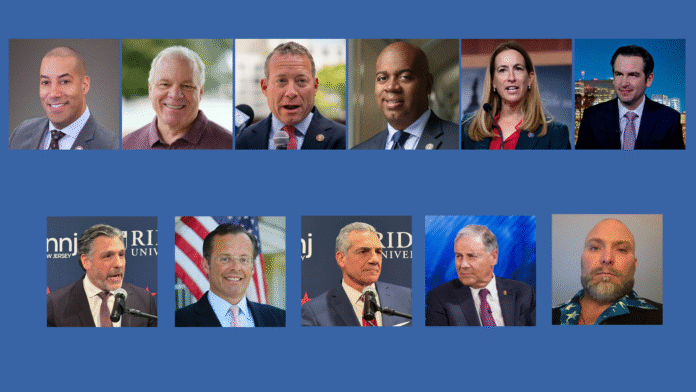As New Jersey approaches its 2025 gubernatorial election, the political landscape is charged with urgency and transformation. Voters are grappling with rising costs, shifting political dynamics, and a reevaluation of leadership. In this detailed analysis, we delve into the key issues and figures shaping the state’s political future.
Affordability at the Forefront: Gubernatorial Candidates Propose Solutions

With the June 10 primary fast approaching, affordability has emerged as the central theme in the gubernatorial race. Voters across New Jersey are expressing concerns over escalating property taxes, housing costs, and energy expenses. Candidates are responding with a variety of proposals aimed at alleviating these financial pressures.
Democratic Candidates:
- Mikie Sherrill has outlined a comprehensive plan to address affordability, focusing on expanding affordable housing, reforming the tax credit system, and increasing funding for the Affordable Housing Trust Fund. Her approach emphasizes regional coordination and modernizing the state’s affordable housing infrastructure.en.wikipedia.org
- Steven Fulop, Mayor of Jersey City, has proposed a statewide transportation agenda that includes expanding NJ Transit services, introducing congestion pricing similar to Manhattan’s model, and enhancing the PATH system’s integration with NJ Transit. He also advocates for reducing in-person transactions at the Motor Vehicle Commission to streamline services. en.wikipedia.org
Republican Candidates:
- Jack Ciattarelli, a former state assemblyman, has pledged to reverse policies he deems restrictive, such as sanctuary state measures, and to reduce taxes by 2% annually through waste elimination. He has secured an endorsement from former President Donald Trump, who praised him as a “true champion” capable of shifting the state from Democratic to Republican control.
- Mario Kranjac, the mayor of a Democrat-leaning town, has positioned himself as a political outsider. Endorsed by Newt Gingrich, he advocates for tax cuts, term limits, and a focus on education reform. His platform emphasizes reducing government waste and opposing federal overreach.
As the election nears, the debate over affordability continues to dominate, with each candidate presenting distinct visions for the state’s economic future.
Mikie Sherrill: Redefining the ‘Establishment’ Narrative
Congresswoman Mikie Sherrill’s bid for governor has sparked discussions about the evolving nature of political establishment in New Jersey. Critics label her as the “establishment” candidate, but her career trajectory suggests a more nuanced position.
Sherrill first entered politics by flipping New Jersey’s 11th Congressional District from Republican to Democratic control, defeating a long-standing incumbent. Her background as a Navy veteran and federal prosecutor resonated with voters seeking a departure from traditional political figures.
While she has garnered support from established Democratic leaders like LeRoy Jones and Kevin McCabe, Sherrill’s approach emphasizes collaboration and reform. She advocates for modernizing the state’s affordable housing system, enhancing transportation infrastructure, and ensuring environmental protections.
Her campaign reflects a blend of experience and a commitment to progressive change, challenging the conventional definitions of political establishment.
Legal Precedent: NJ Supreme Court Upholds Turnpike Authority’s Bid Rejection

In a significant legal development, the New Jersey Supreme Court upheld the New Jersey Turnpike Authority’s (NJTA) decision to reject a bid from El Sol Contracting for a bridge redecking project. The court ruled that the rejection was not arbitrary or unreasonable, affirming the NJTA’s authority in procurement decisions. law.justia.com
This ruling underscores the importance of adherence to procedural requirements in public contracting and may influence future bid disputes.cohenseglias.com
National Spotlight: Booker and Cruz Clash Over Immigration Policies
Senators Cory Booker and Ted Cruz engaged in a heated exchange over immigration policies, highlighting the stark contrasts between their political ideologies. Booker, representing New Jersey, emphasized the need for humane immigration reform, while Cruz advocated for stricter enforcement measures.
The debate underscored the broader national divide on immigration and showcased New Jersey’s role in shaping federal policy discussions.
Coordinated Enforcement: Multiple Agencies Participate in ICE Operations Across NJ

Multiple federal and state agencies have collaborated in recent Immigration and Customs Enforcement (ICE) operations across New Jersey. These coordinated efforts reflect ongoing tensions between state policies and federal immigration enforcement strategies.
New Jersey’s stance on sanctuary policies and immigrant rights continues to be a contentious issue, influencing both local governance and national debates on immigration reform.
A Pivotal Moment for New Jersey’s Political Landscape
The 2025 gubernatorial election presents a critical juncture for New Jersey. Voters face choices that will shape the state’s economic policies, social justice initiatives, and environmental strategies. The candidates’ platforms reflect a diverse array of approaches to addressing the challenges facing the Garden State.en.wikipedia.org
As the election approaches, it is essential for residents to engage with the candidates’ proposals and consider the long-term implications of their decisions. New Jersey’s political future is at a crossroads, and the outcome of this election will set the course for the state’s development in the years to come.
For ongoing coverage and in-depth analysis of New Jersey politics, visit Explore New Jersey Politics.












